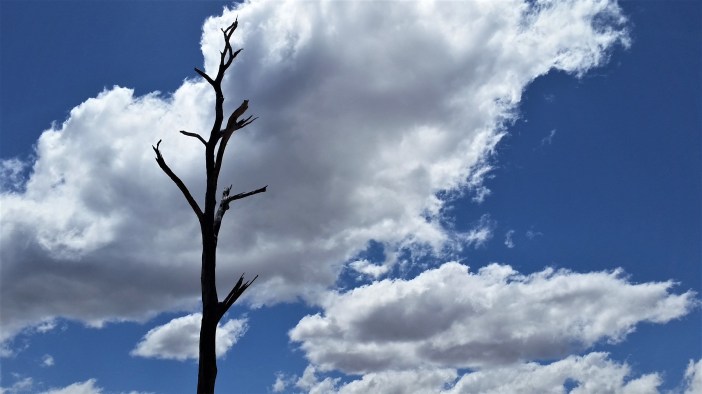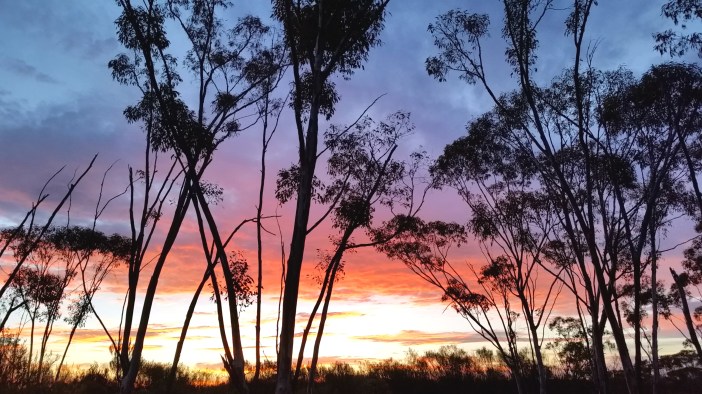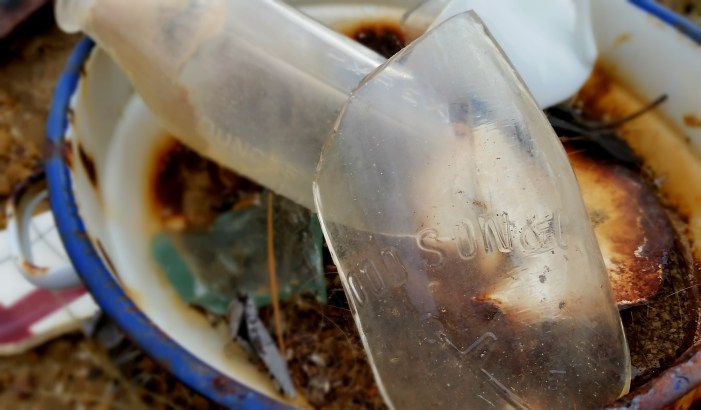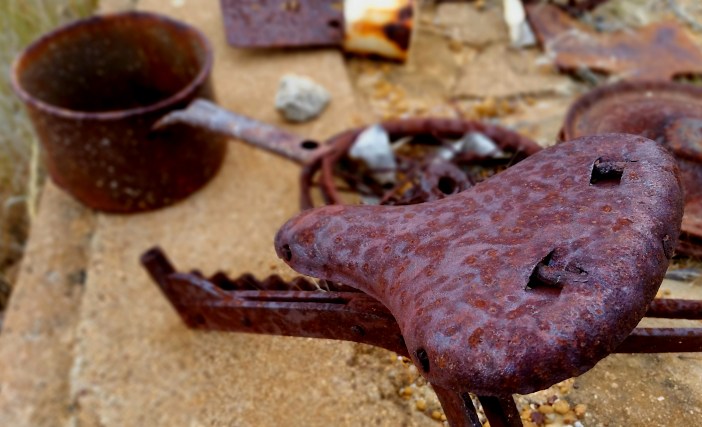“Abba, Amma, Adonai,” Peter and I recited, the Lord’s Prayer flowing from our lips as we read from the Koora Retreat Centre prayer books.
We were sitting in Peter’s home, a train car remodeled into a one-bedroom house with large, beautiful windows that looked out into the Western Australian bush. Outside was sheer wilderness—shimmering golden-brown dirt, scrappy bushes with thick leaves, a few thin trees twisting toward the sky. Birds soared in swirls of heat above.
Peter, a retired Anglican priest with a white, bushy beard, and his wife Anna (also an Anglican priest) run the desert retreat center, which I stumbled across last February. I returned in October to spend a month with them.
I joined them in their railway carriage for morning prayer at 7:30 a.m. each day, and though Anna was out of town this particular morning, Peter and I decided to meet anyway. Somehow, our conversation had turned to gender.
“So Anna tells me you use the pronoun ‘they,'” he’d said after we’d finished our Bible readings and before we’d launched into prayers of the community. Soon we’d run the gamut from the spectrum of gender to the limits of English pronouns.
Peter admitted he struggled with “they” as a pronoun but said, “To me, you’re just Alexis.”
We closed our prayer books after finishing the Lord’s Prayer and offering blessings to one another.
“That’s you,” Peter said a few moments after we finished.
“What’s that?” I asked.
“Adonai.” He paused. “Well, it’s like ‘beloved.’ But it’s not male or female like the others.”
Abba, father. Amma, mother. Adonai.
He told me about the words for God–how the names the Hebrews had for God reflected God’s characteristics. El Shaddai–God’s nurturing and sustaining nature. Yahweh–God’s unchangeable, everlasting nature. Adonai–a loving bond.
“Yes,” Peter said, as I collected his prayer book from him and stacked on the bookshelf beside my chair. “Maybe the Hebrews had it right.”

*
Earlier in the week, I got into a Twitter fight. Peter, Anna, and I had watched Q&A on the ABC, a show in which panelists with competing viewpoints talk about social issues. In this episode, they were discussing the marriage law plebiscite, a postal survey on same-gender marriage issued by the government to gauge public opinion. It was early November, and the voting closed on Nov. 7.
As the Australian public largely supports same-gender marriage, the plebiscite was once described to me as a way for the government to avoid tackling the issue. The survey wasn’t binding. But the government could take its cue to wash its hands of responsibility (i.e., “Well, we can’t make a law around same-gender marriage because the country doesn’t want it,” or “Even though I know some people disagree, the public has spoken in favor of same-gender marriage,” etc.).
Yet, the process seemed haphazard: Even though each Australian of voting age was supposed to get a voting card by mail, friends told me they saw stacks of them in recycle bins at post offices. You didn’t need to identify yourself on the voting cards, so people feared the opposing camp would fill out extras. Additionally, you only got a “yes” or “no” vote, which for some was an uncomplicated way to deal with what might eventually become a complex law.
Regardless, there were religious leaders on the Q&A panel–an Anglican Archbishop from Sydney whose diocese had spent $1 million campaigning for the “no” vote and, to my surprise, a Jesuit priest and human rights lawyer arguing in favor of the “yes” vote.
Later that night, while being dogged by a Twitter user for my support of the one gay person on the panel of four, I mentioned to him that I’m a Christian and said that is why I engage in advocacy and activism–because I am called to serve “the least of these,” to do justice, to show mercy.
“You’re a Christian?” he tweeted back. “You’re kidding, right?”
I pointed him to Google, noting that searching for “LGBT Christian” will pull up a lot of resources made by people a lot smarter than I am. But his bafflement only continued.
In the meantime, another Twitter user chimed in: “You may be a Christian, but it’s still a sin, brother.”

*
I’d recently changed my Twitter profile blurb from “she” to “they.” In my Twitter photo, I have short hair and am wearing a bowtie.
It’s the picture my friend Meg used (with my permission) when training people in the South Carolina Department of Education on LGBTQ issues. People were having a hard time understanding what being “gender non-conforming” or “non-binary” meant, so she started using my photo in a “guess-the-gender” exercise. She said my name was Alex–more gender-neutral than “Alexis” by U.S. standards (though my childhood French pen pal once asked me why I had a boy’s name). They looked over my physiognomy for hints but came up empty.
It is what we do, right? Read and read and read people to put them in the boxes we want.
At the time of Meg’s trainings, even I wasn’t sure exactly where I stood on the gender spectrum. But she used that version of me to talk about gender non-conformity, non-binary folks, the term genderqueer, and other words associated with those who align in the middle of the spectrum.
She warned them against guessing, against doing exactly what they’d tried to do.
Because sometimes, you just don’t know.

*
My mom and I had a strange (for us) conversation the day before I left the United States for the second time within a two-year period. I was back in North Carolina for the summer after more than a year of travel and was about to hit the road again–leaving for South Korea, Singapore, and that month in Australia at Koora Retreat Centre.
Mom and I rarely talk politics, in part because she watches Fox News and I used to work for ACORN, and from this, I’ve grown pretty sure our conversations will go no where. Still, she calls herself moderate and a feminist and tends to be more “fiscally conservative” than anything. And as I’ve often admitted, politics aside, I learned how to be compassionate from her. When I was young and kids acted up or were mean, she taught me to love instead of hate them. “You never know what’s going on at home,” she used to say.
That September day, we were sitting on the back porch of Mom and Dad’s house in suburban Raleigh, the summer heat having broken a little and the overhead fan pushing around the late-afternoon air. We engaged in a winding conversation about why I’m liberal (“I’m a queer feminist, Mom, I mean–“), in which I also had to tell her that anti-gay Republicans are not a “fringe element,” as she’d tried to argue.
As the conversation wound down, we ended up talking about a friend of mine who’d recently transitioned, and I asked her to use “he” pronouns now because he’s a trans guy.
“Oh, I’m sorry,” she said, a little flustered. “I didn’t know.”
“That’s okay,” I said. “I know you didn’t know.”
She paused and then said, “I have a question for you.” She told me of an encounter she’d had in the grocery store. She didn’t know the gender of the clerk checking her out–she said she thought maybe he was a man, but the clerk had makeup, or maybe she was a woman, but the clerk had a deeper voice.
“I don’t want to hurt anyone’s feelings or do the wrong thing or make someone feel bad,” she said earnestly. “So what–what am I supposed to do?”
I smiled. This had been my work for years, teaching people about LGBTQ cultural competency. I told Mom about “they” pronouns and avoiding “ma’am” and “sir” and other tips I could think of.
She sighed. “I just want to do the right thing. Can’t you all just wear buttons?”
I laughed. “We do wear buttons with our pronouns on them at LGBT conferences and things. But it’s not always safe elsewhere.” I paused. “I mean, you do realize this happens to me a lot, too, right? I get ‘sir-ma’am-sir-ed’ all the time.”
Mom didn’t skip a beat. “Yeah, but you do that on purpose.”

*
In Adelaide, Australia, in the bus from the airport to downtown, I met a 20-something adventurer who ended up at the same hostel as me. It was “pub night” at the hostel, and folks had gone to a bar down the street. I was feeling adventurous, too, so when Suzy invited me, I went.
The pub we went to was hosting international night, and the back garden was filled with music and dancing and international students.
I used to hate going to clubs, but as I danced that night with my new friend, I had a blast. Why did I used to hate this? I thought.
But then I realized–there I was in cargo shorts, Tevas, a cap, a button-up shirt, and a chest binder. The more masculine-presenting I became, the safer I was in those spaces, the less I had to worry about men invading my personal space, sexualizing me, and crossing my boundaries.
It was a freedom, and one that Suzy—even with her workboots and jeans and a kind of “whatever, dude” attitude—in some ways didn’t have.
Halfway through the night, guys were buying me shots because they thought Suzy was “my girl” and dancing with all these other dudes. Guys asked my permission to dance with her. Others gave me commiserating handshakes and back pats.
I felt like I’d crossed this invisible line into a world I always knew existed but had never been a part of.
Some, I disabused of the notion that Suzy was “my girl.” Others just perplexed me. Part of me–perhaps from my own masculine privilege or simply the “Mother Hen” I’ve been since grade school–wanted some of them to think we were together out of a sense of protection.
In hindsight, I checked myself. Women often collaboratively protect each other at clubs and bars, just as we’re trained to move in groups and pairs and intervene when dudes get too close or too drunk or too rough. But as a masculine-presenting person, does the nature of those attempts change?
In other words, was I being one of those women who helps another woman stay safe? Or was I that dude, asserting a kind of masculine dominance?
I still don’t know.
I let them call me “bro.” I took the drinks they gave me. I shared them with Suzy when I could.

*
The sky at night in the Australian outback is a great dome filled with stars. Whenever I saw them, I wanted to reach up and pull them down and wrap the galaxies around me.
One quiet night in February, Anna and I stood out in the dark, a huge, old fig tree towering above us, its roots thick and sprawling.
As we stared at the sky, Anna told me about the aboriginal people who once lived there and the communities nearby that she and Peter had built relationships with. The aboriginal people, the rightful owners and custodians of the land–who lived there for 60,000-plus years before Europeans arrived, decimating their customs and culture–they knew and know this country differently than the white Europeans who displaced them.
“We look up at the stars and see constellations,” Anna said. “But the aboriginal people look at the spaces between the stars—the darkness there—to make shapes. The different groups had different stories and interpretations, but some were included in almost all the stories.” She pointed to a big, dark patch amid the stardust of the Milky Way. “The emu in the sky, for example.”
I strained my eyes as I looked upward, the cool night breeze weaving between us as the bugs’ night sounds grew louder. Anna pointed out the head, the body, the tail. I saw its shadowy form emerge from the blanket of stars.
I stood transfixed. To see the same thing but tell a different story. To embrace both the light and the spaces between the light. To see old things and to find your vision changed.

*
In Perth, Peter, Anna, and I stood with a group of clergy in the grassy Northbridge Plaza surrounded by people draped in rainbow flags and holding “Yes Equality” and “Love is Love” signs aloft. The early morning sun was just cresting the tall buildings, and a large screen in front of us piped in a livestream of the ABC, which was about to broadcast the results of the same-sex marriage plebiscite.
The crowd hushed as the official from the Australian Bureau of Statistics came on. He read his notes in an even voice, describing the 12 million-plus who participated, breaking down the regions and ages of participants. “And now the official results of the national marriage equality postal survey.” He paused. “‘Yes’ responses—seven million—”
Shouts rose among the crowd.
“61.6 percent—”
A cheer erupted across the plaza, the clapping and yelling drowning out the statistician’s words. A teenager with a shaved head in front of me cried into their hands and then hugged the person beside them. Words flashed across the screen—“Breaking: Same-sex marriage—Postal survey returns YES result.” Waves of cheers rose up again and again.

*
“Abba, Amma, Adonai,” the prayer books at Koora Retreat Centre read. God is God, a mother, a father, beloved. We are God’s children.
The Anglican Church in Australia moved toward inclusive language long before, but Anna and Peter have worked to make Koora a place where all can simply be.
“It’s the unstructured space,” Anna said to me as we rode the train from Perth out into the desert. “Koora is undeveloped land, wilderness, not a built environment.”
In the desert, we were surrounded by twisting trees and scrubby bushes, huge slabs of granite pushing out of the ground, their pocked surfaces holding water like cupped hands. Birds swooped from tree branch to tree branch, their lovely chirps and hoots unfamiliar to my ears. Kangaroos and families of emus rustled in the woods and ran through the brush. We looked with wonder at geckos and skinks, waiting for their next move.
“The built environment presses in on you,” she said. “It’s like it tells you what to be. It sets up all these expectations.” She paused. “But out in the bush, you just are.”

*
Back at Koora, my feet crunch on the sandy ground. There are remnants of built environments—the old railway line, tin cans left behind by settlers who traveled these paths during the gold rushes of the late 1800s and early 1900s, repair parts for the pipeline they built to bring water from Perth, broken pieces of china, old beer bottles, horseshoes, a child’s tricycle.
We make boxes for things to fit. We bring our silver tea kettles and British china into the desert, trying to bring some semblance of what we know into the unknown.
But here we find them, years later, tarnished and dented and broken. Still, the wind whispers in the trees. Still, the land burns, and it’s only by the heat of the fire that so many of these trees and bushes release their seeds. Still, the emu in the sky looks down.
I think about the stars and the lines we make between them. How we’re so often wrong. We think we have the story right, this one way of seeing. But it is only one way.
Others see the lines and spaces between. They show us how God is beyond our human ways of understanding and, thus, how God’s creation is equally complicated and unbound.
Out here, my gender doesn’t matter, who I love doesn’t matter—just that I love, and love wholly, as God does. Just that I know that I, too, am beloved.
The setting sun casts a glow around me, gilding the bushes’ thick leaves, the fallen branches charred by wildfires, the dusty ground at my feet. I touch the smooth, pale trunk of a tree and pray, “Abba, Amma, Adonai….”

Learn more about Koora Retreat Centre here. Anna and Peter, who run retreats there, are currently on sabbatical, but you can arrange private/solo visits to Koora via their Airbnb listings.
I love you! This is beautifully written. Come home to us soon.
LikeLike
I love you, too. And I’ll be back before you know it. ❤
LikeLike